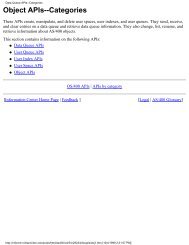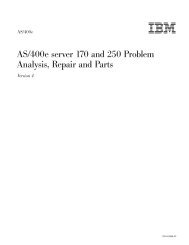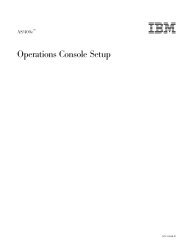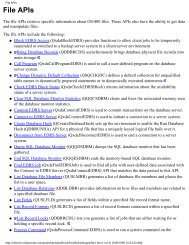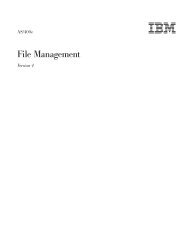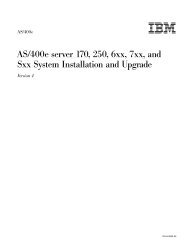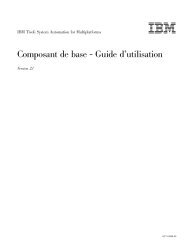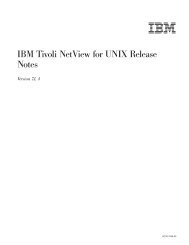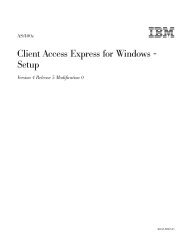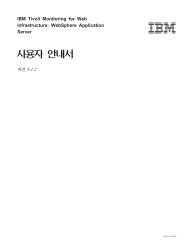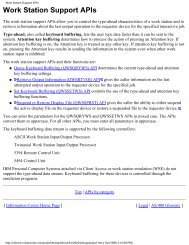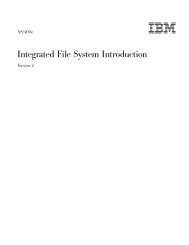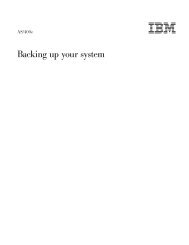Qshell Interpreter (qsh) - FTP Directory Listing - IBM
Qshell Interpreter (qsh) - FTP Directory Listing - IBM
Qshell Interpreter (qsh) - FTP Directory Listing - IBM
Create successful ePaper yourself
Turn your PDF publications into a flip-book with our unique Google optimized e-Paper software.
Variables used by <strong>qsh</strong><br />
14 <strong>Qshell</strong> <strong>Interpreter</strong> (<strong>qsh</strong>)<br />
RANDOM (Random number generator)<br />
This variable is set by <strong>qsh</strong> to an integer random number between 1 and<br />
32767 each time it is referenced. You can seed the random number<br />
generator by setting the variable.<br />
REPLY (Reply variable)<br />
This variable is set by read to the characters that are read when you do not<br />
specify any arguments.<br />
TERMINAL_TYPE<br />
This variable is set by <strong>qsh</strong> to the type of terminal attached to the standard<br />
file descriptors. The value is set to 5250 when attached to a 5250 display,<br />
to REMOTE when attached to a remote client, or to PIPELINE when<br />
attached to pipes.<br />
CDPATH (Search path for cd)<br />
If the directory you specify for cd does not begin with a slash (/), <strong>qsh</strong><br />
searches the directories listed in CDPATH in order for the specified<br />
directory. The value of the variable is a colon separated list of directories.<br />
The current working directory is specified by a period (.) or a null directory<br />
before the first colon, between two colons, or after the last colon. There is<br />
no default value.<br />
ENV (Environment file)<br />
When <strong>qsh</strong> is invoked, it performs parameter expansion, command<br />
substitution, and arithmetic expansion on this variable to generate the path<br />
name of a shell script to run in the current environment. It is typically used<br />
to set aliases, define functions, or set options. There is no default value.<br />
HOME (Home directory)<br />
The value of this variable is the path name of your home directory. The<br />
value is used for tilde expansion and as the default argument for cd. The<br />
value is set by default to the value specified in your user profile.<br />
IFS (Internal field separators)<br />
The value is a string treated as a list of characters that is used for field<br />
splitting and to split lines into fields with read. The first character of the<br />
value is used to separate arguments when expanding the * special<br />
parameter. The default value is .<br />
LANG (Language locale)<br />
This variable defines the locale category used for categories that are not<br />
specifically set with a variable starting with LC_. There is no default value.<br />
LC_ALL (Locale settings)<br />
This variable overrides the value of any variables starting with LC_. There<br />
is no default value.<br />
LC_COLLATE (Locale collation)<br />
This variable defines the collation relations between characters. There is no<br />
default value.<br />
LC_CTYPE (Locale character classes)<br />
This variable defines character types such as upper-case, lower-case,<br />
space, digit and, punctuation. There is no default value.<br />
LC_MESSAGES (Locale message formatting)<br />
This variable defines the format and values for affirmative and negative<br />
responses from applications. There is no default value.



